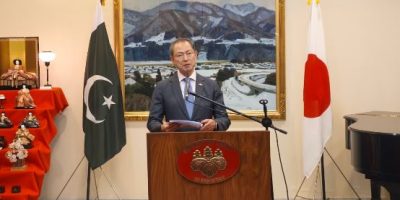Pakistani govt: in a dilemma, how to contain COVID-19: Report

Gwadar Pro App said in a report on Thursday that in the past few weeks, the Pakistani government, military and people have made unremitting efforts to control the spread of COVID-19.
However, the spread of the pandemic has not been effectively curbed yet.
According to the report, the main difficulty is that Pakistan’s population base is large with a density of 256 people per square kilometer. Second, two of its neighboring countries are heavily affected by the pandemic, with a total of 85,996 confirmed cases in Iran and 20,178 confirmed cases in India.
Third, there is a serious shortage of medical resources and anti-pandemic materials with limited international support, 80% of which comes from China. Fourth, in terms of COVID-19 prevention and control measures, there is a lack of national joint strength.
While fifth difficulty is that Pakistan’s economy and finance are in a difficult state. As the proportion of the poor living on daily income is quite high, the government has to consider a balance between fighting the pandemic and developing the economy, preventing the poor from going hungry.
It seems that in the face of severe pandemic and practical difficulties, the Pakistani government is in a dilemma. Prime Minister Imran Khan has repeatedly said that they have to face and fight the pandemic, and at the same time, they also have to fight against unemployment and hunger to ensure that tens of millions of the poor do not die of hunger as a result of the lockdown.
With Ramadan approaching, Pakistan’s pandemic prevention and control will be more difficult. Ramadan is the peak period of family reunion and Muslim prayer in mosques in Pakistan.
The poor will gather in front of the rich’s houses and wait for alms. During Ramadan, the rich pray with the poor, the elderly pray with the young, which will increase the risk of the spread of the pandemic across classes and ages.
After Ramadan, Pakistanis will get together to celebrate in restaurants, and related activities may easily cause cross infection.
On April 18, the Pakistani government and religious leaders held talks on how to prevent the further spread of the novel coronavirus during Ramadan, and formed “20-point Standard Operating Procedures” to follow during Ramazan. After the talks, President Arif-ur-Rehman Alvi announced that Pakistanis can go to mosques for prayer on the premise of complying with the pandemic prevention requirements, i.e. maintaining social distance.
On April 20, Pakistani Prime Minister Imran Khan met with a delegation of well-known religious leaders to discuss measures to prevent and control the spread of the novel coronavirus, and the two sides reached a compromise.
Religious leaders agreed with the government’s strategy to fight the pandemic and assured the Prime Minister of full cooperation. At the same time, religious leaders thanked the government for its decision to reopen mosques during Ramadan.
On April 21, the Pakistani government announced that the current lockdown measures to control the spread of the pandemic would be extended for two weeks, mainly for schools and public places, but the lockdown measures will be lifted gradually for the construction and industrial production industries from April 22.
From the above, it seems that in the days to come, the spread of the novel coronavirus is more difficult to contain, and the outbreak may reach a peak next month.
Related News

Ambassador eyes deeper Japan-Pakistan bonds through youth, AI
ISLAMABAD, FEB 6 /DNA/ – Akamatsu Shuichi, Ambassador of Japan to Pakistan, has said thatRead More

British High Commission celebrates Scottish-Pakistani ties at ‘Caledonian Ball’ in Lahore
ISLAMABAD, FEB 5 /DNA/: Held at the historic Sir Ganga Ram Residence, Wednesday’s Caledonian BallRead More


Comments are Closed